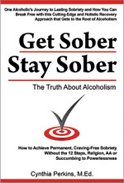Alcoholism Symptoms
Alcoholism symptoms serve as a wake up call to the alcoholic to recognize the destructive effects that alcohol is having on their life, body and mind, that if ignored, have dire consequences. The longer one continues down the road of drinking, the more damage that is done. The sooner you recognize the symptoms, the sooner you can take the necessary steps to help yourself.
Behavioral, Emotional and Social Symptoms of Alcoholism
There are a number social, emotional and behavioral symptoms that can be significant indicators that the individual is battling addiction with alcohol. As a matter of fact the symptoms of alcoholism will be most identifiable in the emotional, social and behavioral aspect before many physical symptoms are observed or noticed. By the time physical symptoms occur, alcoholism has already progressed significantly, so it is crucial to pay attention to the many ways in which the condition manifests itself.
- Excessive consumption of alcohol is one of the most predominant symptoms of alcoholism. Alcohol becomes integrated into all areas of their life.
- Ritualizing the consumption of alcohol. The drinking ritual is often associated with lunch or dinner time, and there can be significant stress when the person is unable to drink at those times.
- Time Spent with Alcohol Related Activities. The affected individual will spend an increasing amount of time pursuing activities that allow them to consume, acquire, or recover from alcohol.
- Deception. The individual may develop a system of alibis or excuses for their drinking, or the effects of their drinking. The individual may also lie to avoid their family or friends, in order to spend more time drinking.
- Neglecting Other Activities. As a corollary to the preceding symptoms, the individual will give up or scale back their other social activities, job-related obligations, and prior hobbies or recreational pursuits, in order to maintain their alcohol use.
- Associated Family Issues. Alcoholism symptoms are often exhibited in continuous conflict in relationships, divorce, spousal or child abuse, child neglect and dependence on social services or welfare as income begins to deteriorate.
- Denial, blaming and excuses. An alcoholic is notorious for making excuses to drink, blaming others for the reason they drink and denying that their drinking is causing any problems in their life.
- Inability to control drinking. Drinking that continues even when it is apparent that their are serious consequences to their health, family, employment or social status. An inability to stop drinking even when they have a desire to do so is one of the most clear cut alcoholism symptoms.
- Continuous problems at work, school, or home that are a direct result of their drinking. Others are complaining about their behavior. They are neglecting their duties and responsibilities or not performing them up to par.
- Engaging in risky behavior that put their own or their families physical safety in danger such as driving under the influence or operating machinery.
- Recurring problems with the law like driving under the influence, domestic violence, bar fights and even criminal behavior.
- Frequently missing work or drinking on the job. As alcoholism progresses the alcoholic needs to drink in the morning to relieve the shakes and may not be able to get through the day without sneaking a couple at lunch or on breaks. This behavior may lead to discipline by the employer or even result in getting them fired.
- Changes in emotional stability. Alcoholism is accompanied by frequent bouts of depression, anxiety, irritability and unexplained mood swings. They may vacillate from being docile, easy going and loving to being angry, confrontative and aggressive. They often feel annoyed when they are questioned or criticized about their drinking and respond with personal attacks. They may also experience paranoia, fears without basis, hallucinations, paranoid delusions and contemplate suicide.
- Drinking to deal with feelings. The alcoholic is uncomfortable with feelings and will increasingly use alcohol to deal with stress, sadness, grief, anger, loss etc.
- As alcoholism progresses they begin to neglect their physical appearance, hide alcohol in unusual places, to prevent criticism and questions from others, so they can sneak a drink whenever they want. They are often drinking alone and must drink first thing in the morning to counteract the effects of a hangover.
Physical Alcoholism Symptoms
The physical symptoms of alcoholism are extensive and gone into more thorough detail on their own page, but some of the most common include:
- A very strong urge to drink alcohol. These cravings are sometimes overwhelming, and often manifest themselves as an urge to drink at a specific time of day, or the morning after a night of drinking.
- Memory loss, forgetting what happened during episodes of drinking, also known as blackouts.
- High levels of anxiety and irritability.
- Insomnia
- Liver inflammation or disease,
- High blood pressure
- Elevated tolerance. A person directly affected by alcoholism will be forced to drink increasing amounts over time, just to get the same “buzz” or “high” feelings they were previously able to achieve with less alcohol. As a corollary, this person may be able to drink increasing amounts without exhibiting any signs of intoxication.
- A person affected by alcoholism may experience abdominal pain, nausea, numbness in their extremities, vomiting, red eyes, puffy face and spider veins.
- Withdrawal symptoms. Withdrawal symptoms show up if the individual stops or attempts to stop drinking for any period of time. These alcoholism symptoms often include nausea, jitters or shakes and feelings of anxiousness.
In addition, it is important to note that some types of symptoms differ depending on the stage of alcoholism that the individual is affected by. For example, in the early stages of alcoholism, the symptoms may include an increasing physical tolerance to alcohol, more frequent drinking, and seeking out a greater number of drinking opportunities.
In the middle stages of progressive alcoholism, symptoms can include: frequent hangovers; attempts to stop drinking that are not successful and/or not attempted with a great deal of effort; blackouts that occur with increasing frequency; and further increases in the individual’s tolerance to alcohol.
While in the most advanced stages of the disease, the symptoms can include hallucinations, pancreatitis, extended periods of sustained alcohol consumption (“benders”), and a complete loss of tolerance for alcohol.
Identifying the Symptoms of Alcoholism
Being able to identify the symptoms of alcoholism is the first step for understanding the impact it has on your life and motivating you to do something about it.
End stage alcoholism often ends in death either from cancer, liver disease, heart disease, suicide, malnutrition or accident. If you ignore the messages your body is giving you, then this is the possibility you are facing.
If you are ready to stop drinking now, you can use my self-help program, which has helped me achieve more than 25 years of craving-free and uninterrupted sobriety, and turn this boat around before it's too late.


